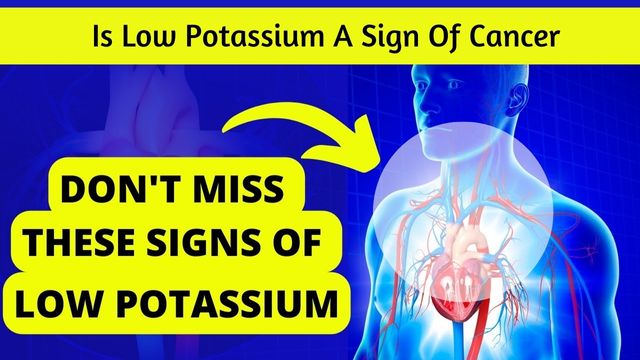Potassium is a vital mineral that our bodies need to stay healthy. It helps our muscles, nerves, and heart work properly. But did you know that low potassium levels might be connected to cancer?
In fact, according to the American Cancer Society, cancer is one of the many conditions that can cause low potassium levels in the body.
In this article, we’ll dive into the world of potassium and cancer. We’ll explore whether having low potassium could be a sign that something’s not right with your health. Let’s uncover the facts and find out what you need to know about this important connection.
What Does It Mean By Low Potassium (Hypokalemia)?
:max_bytes(150000):strip_icc()/hyperkalemia-symptoms-5ad4e0b0642dca00363403f9-632e11ad1a4149e181fe7be2519de615.png)
Low potassium, medically known as “hypokalemia,” is a condition in which the levels of potassium in your blood are lower than what is considered normal. Potassium is an essential electrolyte that plays a crucial role in various bodily functions, including:
- Muscle Function: Potassium helps muscles, including the heart muscle, contract and function properly.
- Nervous System: It aids in the transmission of nerve impulses, allowing your nerves to communicate effectively.
- Fluid Balance: Potassium helps maintain the balance of fluids in and around cells, which is essential for normal cell function.
- Heart Rhythm: It is vital for regulating your heart’s electrical activity and maintaining a regular heartbeat.
When your potassium levels drop below the normal range, it can lead to various health issues. Symptoms of hypokalemia can include muscle weakness, muscle cramps, fatigue, irregular heartbeat, and even paralysis in severe cases.
Hypokalemia can occur due to various reasons, such as inadequate dietary intake of potassium, certain medications, kidney problems, and underlying medical conditions. It’s important to address low potassium levels promptly as they can have serious health implications. Treatment often involves dietary changes, supplements, or addressing the underlying cause, depending on the severity and cause of the condition.
How Do Low Potassium Levels Relates To Cancer?

It’s important to note that low potassium levels alone do not necessarily indicate the presence of cancer.
However, Monitoring and managing potassium levels are essential aspects of cancer care to ensure the overall well-being of patients.
The relationship between low potassium levels (hypokalemia) and cancer is complex and not fully understood. While low potassium itself is not a direct sign of cancer, there are several ways in which these two can be related:
Cancer Treatment: Some cancer treatments, such as certain chemotherapy drugs or radiation therapy, can lead to a drop in potassium levels. These treatments may affect the body’s ability to regulate potassium properly.
Gastrointestinal Issues: Cancer patients often experience gastrointestinal problems due to their illness or as a side effect of treatment. These issues can interfere with nutrient absorption, including potassium, leading to lower levels in the bloodstream.
Loss of Appetite and Dietary Changes: Cancer and its treatments can cause a loss of appetite or changes in taste and eating habits. This may result in reduced potassium intake through food, potentially contributing to low potassium levels.
Metabolic Disturbances: In some cases, the metabolic changes associated with cancer can affect potassium balance in the body. This is especially true for certain cancer types that affect hormone production, such as adrenal tumors.
Medications: Cancer patients often take various medications to manage symptoms and side effects. Some of these medications may affect potassium levels directly or indirectly.
Dehydration: Cancer patients may experience vomiting, diarrhea, or excessive sweating, leading to dehydration. Dehydration can disrupt the balance of electrolytes in the body, including potassium.
Are There Specific Cancer Types That Are More Likely To Cause Low Potassium Levels?
Cancer itself, as a disease, does not directly cause low potassium levels (hypokalemia). However, certain cancer types and their associated treatments or complications can increase the risk of developing low potassium levels. Here are some scenarios where specific cancer types or factors may contribute to hypokalemia:
Colon Cancer: Colon cancer can lead to diarrhea and other gastrointestinal symptoms. Prolonged diarrhea can result in the loss of potassium through feces, potentially causing low potassium levels.
Kidney Cancer: Kidney cancer can directly affect the functioning of the kidneys. Since the kidneys play a vital role in maintaining electrolyte balance, including potassium, kidney cancer or its treatment can disrupt potassium regulation.
Adrenal Tumors: Certain adrenal tumors, such as aldosterone-producing tumors, can lead to excessive potassium loss through urine. This hormonal imbalance can result in hypokalemia.
Chemotherapy: Some chemotherapy drugs may cause gastrointestinal side effects, like diarrhea or vomiting, which can lead to potassium loss. Additionally, chemotherapy may affect kidney function, impacting potassium regulation.
Radiation Therapy: Radiation therapy, especially when used to treat abdominal or pelvic cancers, can cause inflammation and damage to the digestive tract, potentially leading to diarrhea and potassium loss.
Appetite and Dietary Changes: Cancer patients may experience changes in appetite, taste alterations, or difficulty eating due to cancer or its treatments. This can result in reduced potassium intake from food, contributing to low potassium levels.
Dehydration: Cancer patients may be prone to dehydration due to fever, sweating, or other symptoms. Dehydration can disrupt electrolyte balance, including potassium levels.
Are There Dietary Factors That Can Contribute To Low Potassium In Cancer Patients?
Yes, there are dietary factors that can contribute to low potassium levels in cancer patients. Cancer and its treatments can often lead to a reduced appetite, nausea, vomiting, and changes in taste, causing patients to eat less and potentially miss out on potassium-rich foods i.e egg.
Additionally, dietary restrictions and gastrointestinal issues related to cancer or treatment can hinder potassium absorption. Managing diet and discussing dietary challenges with healthcare providers can help maintain healthy potassium levels in cancer patients.
Can Low Potassium Levels Be An Early Indicator Of Cancer?
Low potassium levels (hypokalemia) are not typically considered an early indicator of cancer. While some cancer types and treatments can indirectly lead to low potassium levels, hypokalemia is not commonly used as a specific early diagnostic marker for cancer.
Instead, cancer diagnosis usually relies on a combination of medical tests, imaging, and clinical symptoms specific to the type and stage of cancer.
If you have concerns about cancer or potassium levels, it’s essential to consult a healthcare professional for proper evaluation and diagnosis.
Final Verdicts
Low potassium levels (hypokalemia) are not a direct cancer indicator, but they can be a significant concern for cancer patients.
Treatments like chemotherapy can cause gastrointestinal issues leading to potassium loss, making monitoring vital. Maintaining a potassium-rich diet and staying hydrated are crucial for patients, as is communicating any concerns about symptoms or medication side effects to healthcare providers.
Ongoing research aims to better understand the relationship between potassium and cancer, potentially improving cancer care in the future. Overall, managing potassium levels is an important aspect of cancer treatment and patient well-being.


